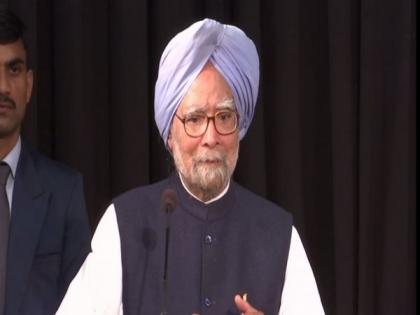UPA governments were very selective in allowing projects that impacted wilderness, wildlife: Manmohan Singh
By ANI | Published: September 7, 2020 09:24 PM2020-09-07T21:24:22+5:302020-09-07T21:43:14+5:30
Laying emphasis on "proper balance" between the demands of economic growth and environmental protection, former Prime Minister Manmohan Singh on Monday said that the UPA governments led by him were very selective in allowing projects that impacted the wildlife or wilderness and they had faced criticism from industrialists.

UPA governments were very selective in allowing projects that impacted wilderness, wildlife: Manmohan Singh
Laying emphasis on "proper balance" between the demands of economic growth and environmental protection, former Prime Minister Manmohan Singh on Monday said that the UPA governments led by him were very selective in allowing projects that impacted the wildlife or wilderness and they had faced criticism from industrialists.
Speaking at an event held virtually in which Indira Gandhi Prize for Peace, Disarmament and Development for 2019 was conferred on broadcaster and natural historian David Attenborough, Singh said he believes it is possible to respect boundaries, to be aware always of the costs of economic development and to refrain from excesses which ultimately rebound.
The former Prime Minister said if a proper balance is not firmly held, the results are deleterious and self-defeating.
He said the UPA governments boosted economic growth and strived for a balance.
"In India during the time that I was Prime Minister, we were conscious of our duty to accelerate economic development and raise the standard of living of our people, especially those in poverty. This is, after all, the first priority of any government. At the same time, we were very selective in allowing projects that impacted the wilderness or the habitat of wildlife. Indeed, we were criticised by industrialists and those who thought we were being too restrictive. But I believe that if a proper balance is not firmly held, the results are deleterious and self-defeating," he said.
Singh said that India, during UPA years, was also an active voice in international forums and discussions on issues concerning the environment. "I like to think we made positive contributions to the protection of the planet," he said.
The Congress leader referred to the situation created by COVID-19 and said that the veracity of David Attenborough's concerns was evident to anyone who looks at the state of the planet today.
He said for some people, this is nature's way of telling humankind to loosen its tightening grip on the resources of the earth, to be less exploitative
"How acute the situation is cannot be clearer than from the pandemic that has gripped the earth, coincidently almost exactly one century after the great influenza epidemic. To some, this is nature's way of telling humankind to loosen its tightening grip on the resources of the earth, to be less exploitative, to respect the needs of the natural world, especially the mal kingdom, more and slow down the pace of environmental destruction," he said.
"But it doesn't need an epidemic to tell us that we are not in good shape. Climate change, the assault on the oceans, the pollution of the atmosphere, the junk floating about in space, the reduction of forest cover, the extinction of life in rivers, the reduction of natural habitat for any life other than humans - all this is evident to anyone who has eyes to see," he added.
He also referred to the dilemma faced by the administrators due to competing demands of growth and environmental protection.
"To be sure there is an acute dilemma here. Millions of us live in abject poverty. Millions around the world do not have access to enough food, clean water and surroundings, a minimum acceptable standard of living. In the name of development, nature bears the brunt, with its long-term crippling effects on that very quality of life we are trying to improve. But like Sir David, I believe that it is possible for us to respect boundaries, to be aware always of the costs of economic development, and to refrain from excesses, from ignorant or wilful actions that ultimately rebound on us," he said.
He hoped that the award will help take the message of Sir David's life and work further. "It is a message that needs to be heeded across the world by leaders who make policies and by the people who elect them or influence them in other ways."
Singh began his speech by paying tributes to former President Pranab Mukherjee who passed away last month and chaired the Jury for the prize for three years.
It was under his guidance that last November the prize was awarded to Sir Attenborough.
Singh said former Prime Minister Indira Gandhi was very concerned and involved with the protection of the environment and the natural world.
"If anyone who can be described as a living legend in the context of the natural world, it is Sir David. Over seven decades, he has been, if I can put it this way, the human voice of nature. He has delighted us, entertained us, informed us and united us with nature in all its glories," he said.
The former Prime Minister said that in recent times David Attenborough has become one of the most vocal and effective advocates of environmental protection, raising his voice against the wanton destruction of the natural world in the name of progress and the seemingly insatiable needs of the human race.
"He has warned of disaster if things aren't turned around, and he has solutions to offer," Singh said.
( With inputs from ANI )
Disclaimer: This post has been auto-published from an agency feed without any modifications to the text and has not been reviewed by an editor
Open in app